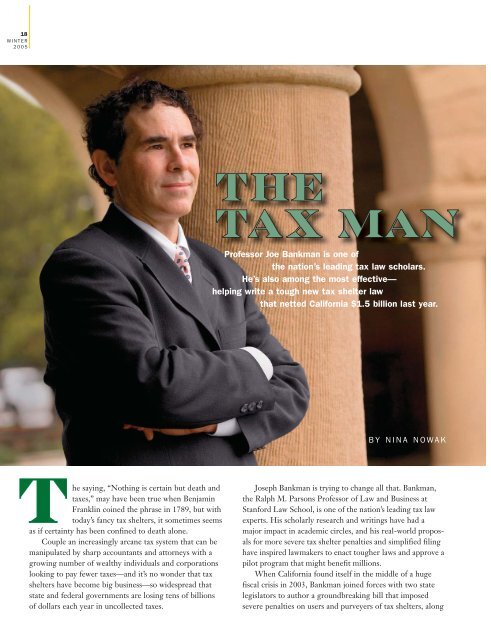THE TAX MAN - Stanford Lawyer
THE TAX MAN - Stanford Lawyer
THE TAX MAN - Stanford Lawyer
- No tags were found...
You also want an ePaper? Increase the reach of your titles
YUMPU automatically turns print PDFs into web optimized ePapers that Google loves.
18WINTER2005<strong>THE</strong><strong>TAX</strong> <strong>MAN</strong>Professor Joe Bankman is one ofthe nation’s leading tax law scholars.He’s also among the most effective—helping write a tough new tax shelter lawthat netted California $1.5 billion last year.BY NINA NOWAKThe saying, “Nothing is certain but death andtaxes,” may have been true when BenjaminFranklin coined the phrase in 1789, but withtoday’s fancy tax shelters, it sometimes seemsas if certainty has been confined to death alone.Couple an increasingly arcane tax system that can bemanipulated by sharp accountants and attorneys with agrowing number of wealthy individuals and corporationslooking to pay fewer taxes—and it’s no wonder that taxshelters have become big business—so widespread thatstate and federal governments are losing tens of billionsof dollars each year in uncollected taxes.Joseph Bankman is trying to change all that. Bankman,the Ralph M. Parsons Professor of Law and Business at<strong>Stanford</strong> Law School, is one of the nation’s leading tax lawexperts. His scholarly research and writings have had amajor impact in academic circles, and his real-world proposalsfor more severe tax shelter penalties and simplified filinghave inspired lawmakers to enact tougher laws and approve apilot program that might benefit millions.When California found itself in the middle of a hugefiscal crisis in 2003, Bankman joined forces with two statelegislators to author a groundbreaking bill that imposedsevere penalties on users and purveyers of tax shelters, along
22WINTER2005<strong>TAX</strong>ESDECONSTRUCTING <strong>THE</strong> <strong>TAX</strong> CODEProfessor Joe Bankman explains what’s wrong with the federal tax code, why a consumption tax makes moresense than an income tax, and why corporations shouldn’t pay any federal taxes at all.Editor: What’s wrong with the federal tax code?Bankman: The common perception that it’s too complicatedis correct. The complaint that a lot of complexity hurtsbusiness is also correct. Most of the complaints about thetax code are correct, although the payoffs for the cure areusually exaggerated.What’s wrong with complexity? It’s expensive for businessto deal with complexity, and it drives the average citizen nuts.It fosters a sense of paranoia. If you can’t understand a provision,you assume that someone else must be taking advantageof it. Sometimes that might be true, but other times it’s not.Finally, to the extent that we treat similar transactions differentlybecause of the complexity in the law, we’re going todiscourage productive investment and invest unwisely. Allelse being equal, complexity is an evil.Complexity also adds to the cost of complying with,and collecting, taxes. How much does it cost to collectincome taxes? Around 15 percent of the tax rate is a ballparkfigure. So if we raise a trillion dollars, the cost ofraising that is at least $150 billion. This includes the valueof everyone’s time when they do their taxes, everything theypay to have taxes done, everything business pays to havetaxes done, along with the cost of running the IRS andother government agencies.That is a huge number. Yes. On the other hand, all taxesare expensive to maintain. Even a sales tax, or VAT [valueadded tax], costs about 10 percent. It isn’t enormously cheaperbecause you’ve got to have a huge bureaucracy to collectthe sales tax, and you’ve got to have all the merchants collectthe sales tax. Look at Europe. They’ve got lots of differentVAT rates, and every new product that’s introduced has tobe evaluated to see what rate it qualifies for. There was acase several years ago involving Head & Shoulders dandruffshampoo—was it a cosmetic or a medicine? If it’s the former,it’s taxed at a high rate. If it’s the latter, it’s taxed at a lowrate. When you go to a European accounting firm or lawfirm, you still see lots of tax lawyers, even though they have aVAT. The income tax is more expensive to comply with, butall taxes are expensive to maintain.So complexity costs money. Yes. And it also distortsinvestment. That’s another important cost—maybe moreimportant. Current tax law discourages investment becausewe tax investment, and it distorts the decision to invest inone area rather than the other.Doesn’t complexity also make it easier to slip in a taxbreak for a special interest? Probably true. And some ofthe tax breaks are not to corporate America, but to individualswith a cause. So you might have a tax break for highereducation or for teacher supplies.Doesn’t complexity also make it easier to devise taxshelters? That’s right. You can think of a tax shelter assomeone interpreting the language of a law to produce aresult that’s never intended. Today, we have to worry aboutwhether any of these tens or hundreds of thousands of rulescan be misinterpreted. If you have a simpler system, youdon’t have so many points of vulnerability.What are the alternatives to our present tax code?There’s only one main alternative with different varieties,to tax consumption rather than income. There are severalreasons to do this. It is easier to measure consumption thanincome, which makes it simpler to enforce, and less expensiveto comply with and administer. A consumption tax also letsindividuals and businesses invest without the distortive effectsof tax laws. And by not taxing investment there is reason tobelieve that the economy will grow faster. How could you taxconsumption? One way is the value added tax, which, as I’vealready explained, is complex to implement. A simpler way isto create what is in effect an unlimited IRA. You can deductanything you put into it—$3,000 or $3 million. You’re onlytaxed when you take money out, and you can take the moneyout whenever you want. Then, by definition, we’d only betaxing consumption, because you wouldn’t withdraw moneyuntil you wanted to spend it. It’s a cash flow tax, and the wayto do it is to have an unlimited IRA for everyone.Are there other forms of consumption tax? We now havetwo forms of IRAs—the “regular” IRA and the Roth IRA.In a Roth IRA, you get no deduction for contributions, butyou’re never taxed on your investment returns. It turns out,for reasons I won’t go into here, that the two forms of IRAsare equally advantageous for taxpayers. In one, taxpayersget a deduction going in but are taxed later on; in the other,there’s no deduction going in, but no tax later on. We could
<strong>TAX</strong>ES 23STANFORDLAWYERhave a consumption tax based on the Roth IRA model. Itwould look just like a graduated payroll tax. I think we’reless likely to adopt this form of consumption tax.Why is that a consumption tax? Because it has the sameeffect. If one IRA leaves taxpayers in the same position asthe other, then by definition we can say you’re in the sameposition if we have an explicit consumption tax or this oddform of payroll tax.But wouldn’t a payroll tax have a much greater impacton wage earners? And how would other forms of compensation,like stock options, be treated? You’ve pointedout two important things. Comparing an unlimited IRAconsumption tax to a payroll tax shocks people, because theysay, “Well, a payroll tax, we’re just taxing the working stiff.We’re not taxing the wealthy as well.” In fact, any form ofconsumption tax will raise distributive concerns. The peoplewho will benefit from an unlimited IRA are the peoplewho are making an investment. They’ll benefit by getting adeduction going in. If you’re poor, and you don’t invest anythingbecause you don’t have any money to invest, you getnone of the break, and you’ll be bearing a proportionatelylarger share of the tax burden. It’s also true with the RothIRA. Both are going to favor the wealthy, and under plausiblecircumstances, both favor the wealthy just as much. Thesecond point you make is quite correct and quite subtle, thatwe can’t really distinguish income from labor and capital. Agood example is someone in Silicon Valley who gets stockoptions. That is why we’re more likely to implement a consumptiontax through an unlimited IRA than a payroll tax.And if we want a progressive consumption tax, we’re morelikely to have an unlimited IRA than a VAT. With an unlimitedIRA consumption tax, we can have progressive rates, sothat somebody who spends $1 million a year pays a highertax rate than someone who spends $20,000 a year.Aren’t there ways to mitigate the impact of a sales taxon lower income people? The most obvious thing to dois what Europe does, by having different rates on differentgoods, so that luxury goods get taxed at a higher rate. Theproblem is that you’ve got to classify every good sold onwhether it’s a luxury or necessity. And the fact of the matteris, even Bill Gates drinks milk, maybe, and even poor folksin Houston need air conditioning. So that turns out to be amessy and expensive way of building progressivity in, and itdoesn’t do a very good job. You could give a rebate to peoplewith low incomes for the sales tax they pay. The problemwith that is then you really have two tax systems. You havethe new sales tax system, and you have to maintain anincome tax to know whether you get the rebate. My guess isthat it’s more likely we would simply go the unlimited IRAroute rather than adding on a federal sales tax.How would businesses be treated under a consumptiontax? If you had a consumption tax, what’s the proper levelof tax on corporate income? The answer is zero, becausecorporations don’t consume. Imagine putting your auto supplybusiness inside this IRA, metaphorically. Everything youput in is deductible off your salary income. The auto supplybusiness can make a trillion dollars, but you won’t be taxeduntil you take that money out of your IRA to spend it. Thatwould simplify life for business taxpayers. It simplifies life,though, by effectively getting rid of the business tax.What percent of federal taxes is provided by the corporateincome tax? Maybe 15 percent or 20 percent, whenyou consider other sources of income that individuals getfrom investment. But the vast majority of what we’re gettingcomes from salary, so the argument in effect is, let’s justwrite off the business income. That would reduce the aggregateamount of money we spend on tax planning, because it’smore expensive for businesses than for individuals. It wouldhelp our economy because businesses would no longer investin one arena rather than the other for tax reasons, becauseeffectively we’re not taxing them anymore. And it wouldlead to a greater pie over the long term because reducing thetax on business income to zero would stimulate investment.It has the unfortunate effect, for some of us, of concentratingmost of the gains at the very top end. But economistsagree that we get a bigger pie with the consumption tax. Ifanything, that’s understated because economists considermostly the fact that investment is going to increase, anddon’t count the payoff from getting rid of complexity—thetax planning costs and the tax planning distortion. So youhave to ask the question, would you like a society where thepie is much bigger for the top 2 percent, and a little biggerfor a lot of people, but the pie is more unequally divided?Isn’t there a way of getting rid of complexity thatdoesn’t put the tax burden more on the mass of people?There probably isn’t. If all we care about is helping peopleat the bottom with complexity, there are lots of things wecan do. But if what we’re talking about is reducing theaggregate cost of collecting taxes, there doesn’t seem to bea way of doing it that doesn’t benefit the wealthy more. Sothere’s a trade-off between efficiency, getting the biggest pie,and what some people would call equity, having the distributionof the pie the way you want it. Most everybody wouldrather come up with a tax reform plan that gave us all thepayoffs of a consumption tax, and benefited just the middleclass and the bottom, but it’s just not in the cards.■















